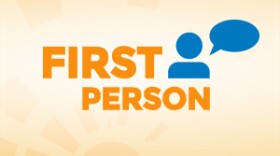It's been five years since the repeal of "don't ask don't tell" , the policy that the end open gay men and women from serving. Today's military is stronger according to Ash Carter. As part of our ongoing first-person series. A local veteran shared his story. He tells us his story. I started wanting to be a Marine when I was young. There was a toys for tots commercial with the Marine standing by a door and a child pulling at the Marine asking if the as Santa Claus. That was one of the first times that I thought about join the Marine Corps. My name is William Rodriguez-Kennedy , I served in the US Marine Corps. I was stationed in Hawaii. I was deployed to Iraq. It became very clear, when I was in high school, I was going into the service. It was clear I would enter serving my country and I come from a background with military veterans, who value service to their country. I served in silence, during the "don't ask don't tell" policy, that policy restricted members of the LGBTQ community from disclosing sexual orientation. It didn't take long for me to realize it would be a great burden. I had to live a double life, in order to keep up appearances and prevent suspicion. It made it difficult to connect with some of my fellow Marines, when I couldn't share all of my life with them. Because of that, it was isolating. In order to keep up appearances. I had a friend at home that would swear she was my girlfriend. I had to go to strip bars and straight bars with my Marines. At some point, I would slip off into the night and hang out with my other friends who knew about me. Never could those two groups of people ever meet. That came with the territory. The isolation, that was one of the arguments. Having gays in the military would weaken unit cohesion and morale, in actuality the policy itself made it harder for those units to be cohesive if they can't trust each other with basic facts of their life. I was outed while I was in Iraq. It was by a subordinate Marine. She had actually just started rumors and that was enough to create the investigation, which then led to me being discharged. I was 21 at the time. My entire life was dedicated to military service. I probably would have been a career Marine. It was a traumatic time for me. When I was discharged, I wasn't adequately prepared to reenter society. I went through a short stint of homelessness. I remember, very vividly, leaving the base and going to the child for the last time and grabbing extra food, I didn't know what was happening. I was emotional and I was afraid of the future. Luckily, I had friends and they found out that I was living out of my car. They took me in and I've been going ever since. It was a huge detriment to my life. Once I got over the depression and homelessness, I started turning my eyes to following -- fighting this policy. Thinking that I had the empowerment to engage in the movement to overturn it. That is when I felt that I could be open and my openness could help others. That first-person interview by Marissa Cabrera, producer for midday edition. Wildfire is not only a problem in the West. You are listening to KPBS Midday Edition.
It’s been five years since the end of the ban on gay men and women from serving openly in the U.S. military.
In a recent statement, to mark the fifth anniversary of the repeal of “don’t ask don’t tell,” Defense Secretary Ash Carter said today’s military is stronger than ever.
“I am proud to report that five years after the implementation of the repeal of "don't ask, don't tell" our military, drawn from a cross-section of America, is stronger than ever and continues to exemplify the very best that our great nation has to offer,” the secretary said. “The American people can take pride in how the Department of Defense and the men and women of the United States military have implemented this change with the dignity, respect, and excellence expected of the finest fighting force the world has ever known.”
As part of our ongoing First Person series, we check in with Marine veteran William Rodriguez-Kennedy. He was discharged under the policy and talks about what it was like to serve in silence and how being kicked out of the military affected his life.
Hit the play button above to hear his story.






